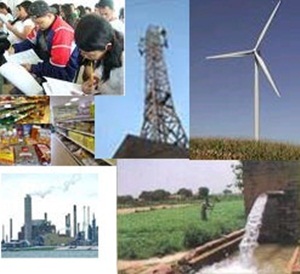The Indian economy is expected to grow at a robust 7.3 per cent in 2018-19 and 7.5 per cent in the next two years, retaining its tag as the fastest-growing major emerging economy, as “factors holding back growth in India fade”, the World Bank has forecast.

Growth in India will be driven by robust private consumption and strengthening investment, which could propel India’s economic growth in the next three years, the World Bank said in its June 2018 edition of the Global Economic Prospect report.
The report, released on Wednesday, says growth in South Asia is projected to strengthen to 6.9 per cent in 2018 and to 7.1 per cent in 2019, mainly as “factors holding back growth in India fade.”
Previous reports by international lenders had cited the side effects of demonetisation and the implementation of the goods and services tax (GST) had impacted India’s growth. Yet, India continued to retain the tag of the fastest growing country among the world’s major emerging economies.
India’s growth projections remain unchanged since its January 2018 forecast. China is expected to slow down slightly from 6.9% in 2017 to 6.5% in 2018, 6.3% in 2019 and 6.2% in 2020, it said. India’s growth potential is about 7%, and it is currently growing at a pace above its potential, he said, attributing it to the major economic reforms and fiscal measures undertaken by the government.
The bank said investment growth in India has firmed recently, as the effects of temporary factors wane.
The bank projected growth in South Asia accelerating to 6.9 per cent in 2018, mainly reflecting strengthening domestic demand in India as temporary policy-driven disruptions fade.
Elsewhere in the region, ongoing recoveries in Bangladesh, Pakistan and Sri Lanka are expected to be accompanied by moderating activity in Afghanistan, Bhutan and Maldives, the World Bank said.
“Over the medium term, growth is expected to remain strong and reach 7.2 per cent by 2020 amid robust domestic demand. Downside risks continue to predominate. They include the possibility of fiscal slippages, delays in reforms to resolve financial vulnerabilities and improve the health of regional banking systems, and a faster-than-expected tightening in global financing conditions,” the report said.
Stronger-than-envisioned global growth could result in better regional growth outcomes, it added.
Despite recent softening, global economic growth will remain robust at 3.1 per cent in 2018 before slowing gradually over the next two years, as advanced-economy growth decelerates and the recovery in major commodity-exporting emerging market and developing economies levels off, the World Bank said on Tuesday.
“If it can be sustained, the robust economic growth that we have seen this year could help lift millions out of poverty, particularly in the fast-growing economies of South Asia,” World Bank Group President Jim Yong Kim said.
“But growth alone won’t be enough to address pockets of extreme poverty in other parts of the world. Policymakers need to focus on ways to support growth over the longer run — by boosting productivity and labor force participation—in order to accelerate progress toward ending poverty and boosting shared prosperity.”
Activity in advanced economies is expected to grow 2.2 per cent in 2018 before easing to a 2 per cent rate of expansion next year, as central banks gradually remove monetary stimulus, the June 2018 Global Economic Prospects says.
Growth in emerging market and developing economies overall is projected to strengthen to 4.5 per cent in 2018, before reaching 4.7 per cent in 2019 as the recovery in commodity exporters matures and commodity prices level off following this year’s increase.
This outlook is subject to considerable downside risks. The possibility of disorderly financial market volatility has increased, and the vulnerability of some emerging market and developing economies to such disruption has risen. Trade protectionist sentiment has also mounted, while policy uncertainty and geopolitical risks remain elevated.
“The projected decline in commodities’ consumption growth over the long run could create challenges for the two-thirds of developing countries that depend on commodity exports for revenues,” said World Bank senior director for development economics, Shantayanan Devarajan. “This reinforces the need for economic diversification and for strengthening fiscal and monetary frameworks.”
Another special focus finds that elevated corporate debt can heighten financial stability concerns and weigh on investment. Corporate debt — and, in some countries, foreign currency debt — has risen rapidly since the global financial crisis, making them more vulnerable to rising borrowing costs.
“Policymakers in emerging market and developing economies need to be prepared to cope with possible bouts of financial market volatility as advanced-economy monetary policy normalization gets into high gear,” said World Bank Development Economics Prospects Director Ayhan Kose. “Rising debt levels make countries more vulnerable to higher interest rates. This underlines the importance of rebuilding buffers against financial shocks.”
The report urges policymakers to implement reforms that lift long-term growth prospects. A rapidly changing technological landscape highlights the importance of supporting skill acquisition and boosting competitiveness and trade openness. Improving basic numeracy and literacy could yield substantial development dividends. Finally, promoting comprehensive trade agreements can bolster growth prospects.




















